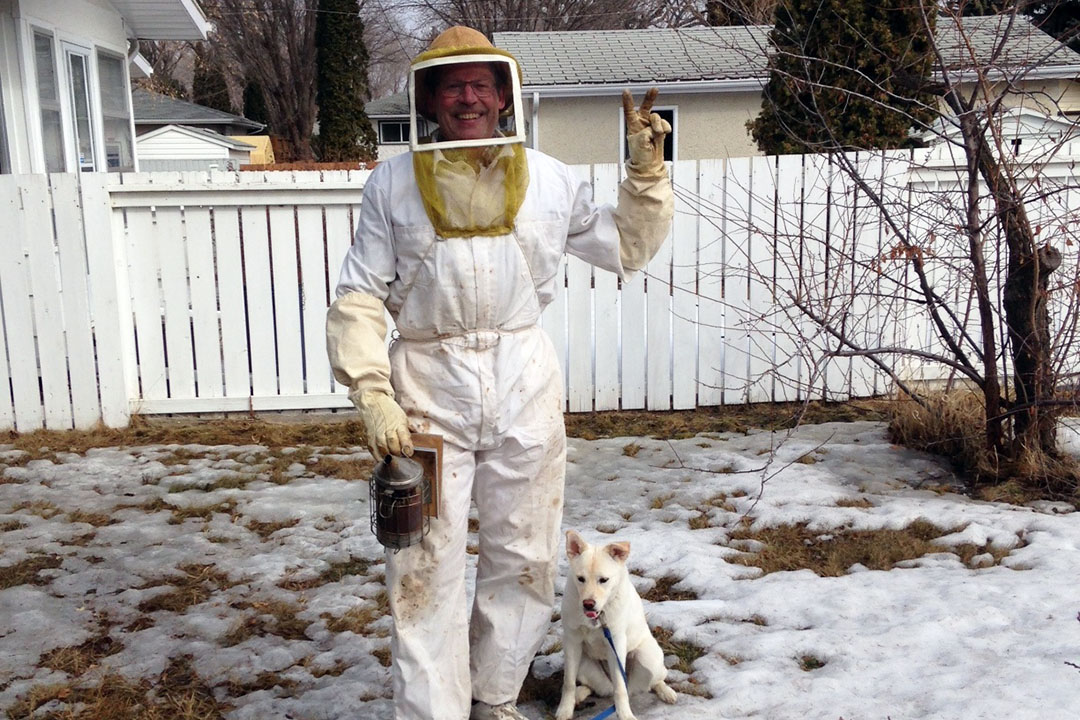
Protecting plant pollinators key to planet’s food supply: USask professor
His fascination with bees started during adolescence.
By SHANNON BOKLASCHUKAs a teenager growing up on his family’s small acreage in Ontario, Dr. Art Davis (PhD) began keeping bees—eventually expanding his hobby to include six hives.
“My dad wasn’t too fussy about it at the beginning, but he relented. I think he could see that this was probably going to become sort of a career path for me, so he didn’t want to get in the way of that,” said Davis, who is now a biology professor in the College of Arts and Science at the University of Saskatchewan (USask).
Davis joined the Department of Biology as a faculty member in 1994. He currently teaches a plant sciences course devoted to honeybee biology and beekeeping and was honoured with a Provost’s Teaching Award in 2018. He also conducts research on the production of nectar—the main attractant of pollinating insects to flowers, and the key source of honey.
“They’re by far the most important vector of pollen,” Davis said of bees. “Worldwide, there’s just nothing that comes close to how important they are.”
Davis was reflecting on the significance of bees to the global food supply in advance of World Bee Day. In 2017, the United Nations (UN) General Assembly unanimously proclaimed May 20 as World Bee Day, resulting in the first observance in 2018.
The purpose of the annual event is to draw attention to the essential role that bees play in keeping people and the planet healthy. The day also provides an opportunity for governments, organizations and citizens to promote actions that will protect pollinators and their habitats. By carrying pollen from one flower to another, bees serve to facilitate and improve food production around the globe.
The UN notes that caring for bees and other pollinators—such as butterflies, birds and bats—is part of the fight against world hunger. Ninety per cent of all wild flowering plants depend, to some extent, on animal pollination, and pollinators affect 35 per cent of global agricultural land.
Davis’ lab is particularly interested in the pollination of plants found in Saskatchewan, with past projects examining Echinacea, caraway, borage, canola, sundews, purple loosestrife, asters, goldenrod and the prairie lily.
Interestingly, some species of bees are particularly adept at pollinating specific plants, Davis said. Bumblebees, for example, are much better pollinators of garden tomatoes than honeybees. That’s because tomato flowers don’t produce nectar, which is what attracts honeybees. Davis said bumblebees are also “the bee of choice” for blueberries and haskap plants, a relatively new Saskatchewan crop.
It’s also common to see shelters for alfalfa leafcutter bees—a type of solitary bee—in Saskatchewan’s alfalfa fields in mid-summer, Davis noted.
“In those domiciles there will be thousands of individual nests—each nest looked after by a single female leafcutter bee,” he said. “It’s quite a successful industry in Saskatchewan and other parts of the Prairies for alfalfa seed production. In fact, on alfalfa, that bee does a much better pollinating job than your average honeybee does.”
Davis said the current nemesis for beekeepers in Saskatchewan is the Varroa mite, a parasitic organism that attacks adult honeybees and their brood—the term for their eggs, larvae and pupae. The destructive mite, which reproduces in the brood cells, is found across the globe.
“On the world scene, it’s kind of public enemy No. 1,” said Davis, whose lab studies the insect’s behavioural traits and is also interested in exploring non-chemical means of combating the Varroa mite.
Davis noted that Saskatchewan is a significant honey-producing province, with Saskatchewan, Alberta and Manitoba contributing about 75 per cent of Canada’s annual honey supply. Saskatchewan also has about 1,100 beekeepers.
“We are in the honey belt, so to speak,” he said.
Ultimately, bees are “very intelligent creatures” that are key to the world’s food supply and planetary biodiversity, said Davis. He’s pleased that World Bee Day offers people an opportunity to talk about bees and the importance of protecting them.
“If we lose bees, we lose a very dependable source of pollination—and that’s dangerous,” he said.

